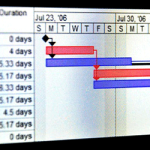
The Program Evaluation and Review Technique (PERT) is a game-changer in project scheduling, offering a structured way to map out the flow of tasks and timelines. At its core lies the PERT chart, a dynamic visual tool that simplifies the planning and coordination of project activities, making it easier to spot dependencies and stay on course. A staple in project … [Read more...]









